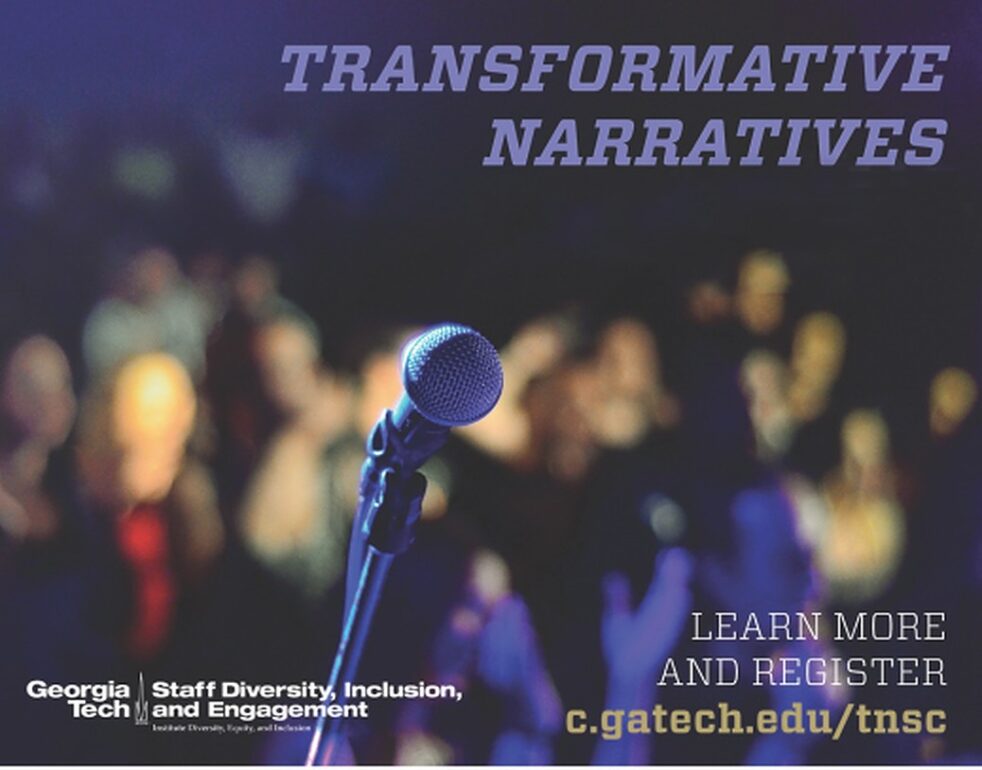Last week, Staff Diversity, Inclusion, and Engagement held its third annual “Transformative Narratives,” a virtual “storytelling crawl.”
The series comprised six story-related events, and included performances from Milbre Burch, Sonny Kelly, and Lani Peterson, all celebrated and nationally touring storytellers.
The stories expressed under told personal experiences with gender, race, identity and more.
The Technique sat in on “‘The Talk’ One-Man Performance, Talk-Back & Story Swap,” event in which Dr. Sonny Kelly spoke aloud his play about sensitive discussions that “we must have with our children as we prepare them to survive and thrive in a racialized America.”
This one-man show artfully portrays the talk Kelly gives his son about growing up Black in the U.S. Kelly plays over 20 characters and brings in literature from Langston Hughes, James Baldwin, W. E. B. Dubois and others. The performance finishes with a literal talk directed at the audience — Kelly emphasizes that this conversation is for everyone.
This last piece of the play, held over BlueJeans and attended by participants from all over the globe, focused on shared experiences and new perspectives gained from Kelly’s play.
The idea of creating unity rather than further dividing his audience, or as he says, “calling everyone in, and not out,” is important to Kelly. He creates community through performance. “All of our stories can be shared in ways that challenge us, that make us uncomfortable,” said Kelly.
Everyone in attendance was organized into breakout rooms, where we discussed our reactions to the play. Audience members expressed the puzzle of identity that “The Talk” expressed.
Phyllis Unterschuetz, fellow storyteller and author of Longing: Stories of Racial Healing elaborated that “for Black boys, their own understanding of their identity has been created by other people. Because of systemic racism, they’ve been robbed of their ability to create their own identity.”
Rebecca Burnett, another audience member, shared her appreciation for the craft of storytelling that Kelly pulled off.
“I’m interested in concepts that are extremely hard to understand put into words that are accessible to people not in the speaker’s shoes,” said Burnett.
Among the topics of conversation was the efficacy of different media to tell a compelling story.
Speaking from the perspective of an author, Unterschuetz said that “there is something about theater that breaks resistance to learning and to hearing.”
A lively performance is key to a great story, but so is vulnerability.
“You have to tell personal stories to get things across. Otherwise, readers close up,” said Unterschuetz. She went on to say that “narrative is an astoundingly powerful tool. I’m interested in extending the venues of narrative beyond storytelling.”
The breakout group discussed the reaches of storytelling, with one member reflecting that the politics of storytelling speak to people who “already have strong beliefs about community & humanity.”
Back in the main room, Kelly shared his advice on the craft of creating a story. “You’ve got to let the story breathe — the story has its own spirit.”
He spoke about the particular place of Black men in this country. “Things haven’t changed much over time about the way we treat Black men in America,” said Kelly.
Pearl Alexander shared that she almost sees “different versions” of her America. “Being a Black parent at these times is hard. Trying to be strong and brave in these circumstances [is hard],” said Alexander.
Kelly spoke on the different expectations for Black children, telling about his painful experience explaining to his son the hurdles he’d have to face.
While a white boy banging on a vending machine would likely be seen as well-intentioned mischief, when his son did this, Kelly lost his temper and disciplined his son rather harshly. He explained that “a Black boy could have “been interpreted as vandalizing the vending machine for banging on it.”
This difficult place Black parents in the U.S. hold is a shared experience between many audience members — some said they felt apologetic for doling out seemingly harsh discipline on their children, but felt they were forced to to protect them from racial injustice.
In fact, the difficult conversations that families have with their children are not limited to Black parents. Kelly pointed out the necessity of white parents and grandparents being involved with the lives of their Black children and grandchildren.
“They have the same obligation as Black family members to share their kid’s life and speak on it.”
Kelly places a large emphasis on invitation in his work. He believes that storytelling can teach even those who seem closed off to conversation.
“Ignorance, when presented with humility and grace, should be answered,” said Kelly.
Lani Peterson remarked that the event had been a “powerful experience… on so many levels; race, white privilege, motherhood, power of storytelling to connect, deepen and begin to understand something from the inside out.”
Recordings of each storytelling event going back to 2017 can be found on the Staff Diversity, Inclusion, and Engagement website.
